Directions
While creating this salami, I was contemplating on the life and theology of Friedrich Schleiermacher, the father of the liberal theology. Here and now, I stipulate that his understanding of life as a “taste of\for infinity,” ability to reconcile Kant with Spinoza, acceptance of knowledge as a product of experience, definition of religion as the rationalization of the sense of the absolute dependence could be possible only due to the fact that he was a married man. And I’m not even mentioning Schleiermacher’s thoughts on synthesis of the real and ideal…
In my case, all roads lead to Rome, and all theology – to sausages. My humble task is only to take all the lessons that Schleiermacher learned from marriage and apply them to charcuterie. The truth, my friends, is not in wine – in vino veritas – but in good salami…And this is a good salami indeed.
The three different versions of this salami are due to the fact that forcemeat was staffed into chitterlings, beef bung, and to the casing that known as the hog bung or rosette or full budello gentile. Although the conditions for fermentation and curing where identical, the time they had to spent in the Curing Chamber was, understandably, different. This, together with the properties of the casings, allowed the development of subtle, but clearly noticeable differences.
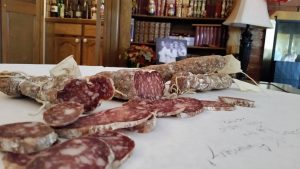
First, I got the salami from chitterlings. For them the whole process took 2 month and three weeks. The total weight loss was 51% . Yet, due to the amount of wine, the texture corresponded to the typical 42-43%. As for the taste, it’s just like 18 years of marriage: not a delicate sheep casing, but not the hog bung either. Each season of our lives together brings more and more tranquility. Just like in salami, the direct correlation is clear: the more shit and time passes through us, the more delicate, sophisticated, and truly valuable the end-product becomes.
Taste – great; smell – wonderful. Spices serve as a barely noticeable background to the “porkiness” of the product. There is no hint of any “sourness” or acidity in taste. The smell and taste is like a simple dry-cured sausage, bought from some artisan on a narrow street of a southern town in Old Europe. And that takes me back to Schleiermacher with his concept of our participation in the supreme union of the All and consciousness of the unity of world and reason. Through temporal, we touch the infinite. Our individual universe\cosmos, meaningful marriage, a decent salami can be truly appreciated and accepted in their fullness with realization that through them God partakes in Divine Communion with Creation.
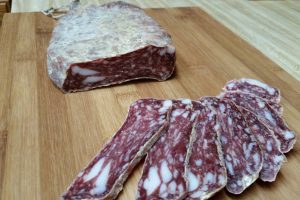
After additional month and two weeks arrived salami, staffed in the beef bung and pressed. This one lost 44%. In comparison with the version from the early December, garlic is more pronounced and accentuated by porcini. It was a very balanced, decent, “old world” quality dry-cured sausage
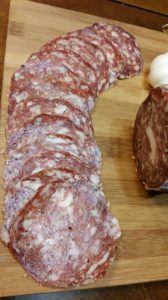
Finally came the of “18th Anniversary Salami”; this one endured another two weeks. Since it was staffed in the hog “bung”\budello gentile that was cut in half, the weight loss came to only 45%. The taste was very even, with notes of wine and garlic on background. After removing the casings and slicing some, I’ve vacuum sealed the rest. For over a year now, I’ve been removing some from time to time and finding that although the marriage does not mature well under the vacuum and constant press, sausages do…
Recipe:
2268 gr. lean pork (loin) with 4823gr. semi-fat pork (boston butt without neck) were cubed and mixed with 2.65% sea salt, 0.25% cure #2 and sent to the refrigerator. On the next day: lean pork went through 2mm grinder, semi-fat – 8mm. Then, I added 209gr. hand-cut mangalitsa backfat to have the total weight of the meats 7300gr. This weight constituted the 100% from which salt, cure, and spices were calculated.
Spices: dried porcini powder – 0.1%; Rosemarino Spezzato – 0.25%; Finocchio Selvatico di Calabria 0.1% ;Black Pepper – 0.5%; garlic powder – 0.25%; dextrose – 0.5%; blackstrap molasses – 0.03%; F-LC Cultures; Syrah-Grenache. In this point I took an unorthodox direction and added a lot more wine that usual to the almost “spreadable” consistence for the sake of experimentation. After sprinkling with mold and fermentation at the lowest allowed for this culture temperature , salami when to the Curing Chamber. During the fermentation, some sausages went under a primitive press.
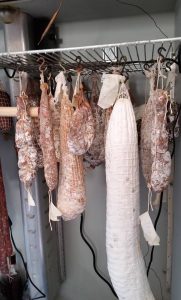
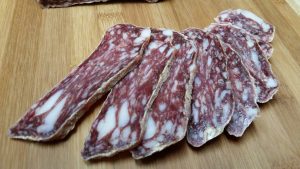
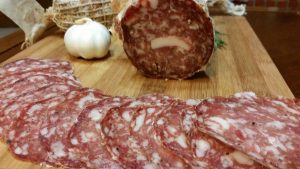


 Русский
Русский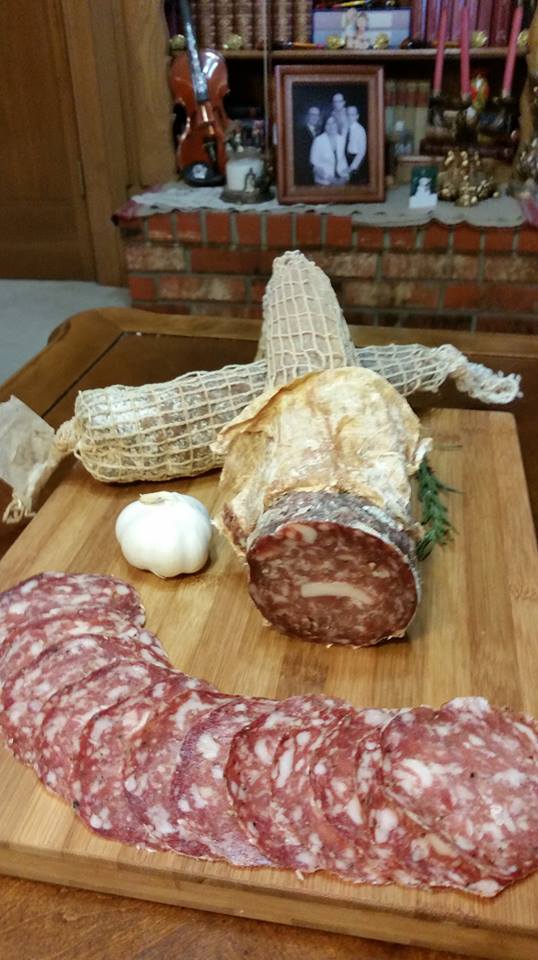



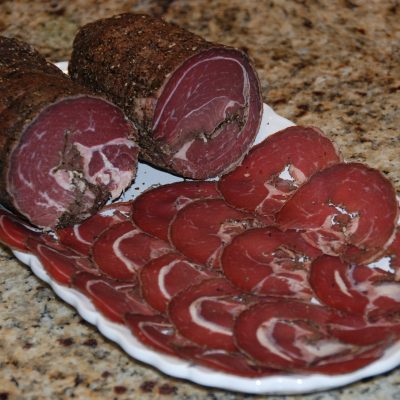
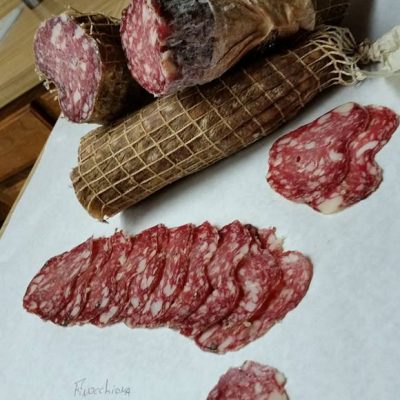
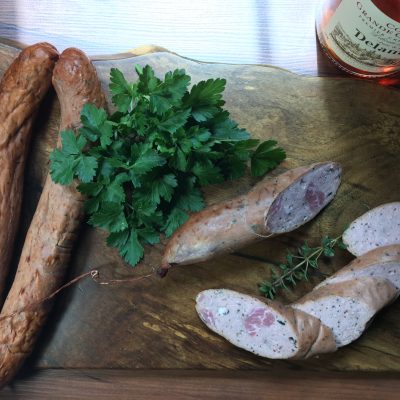
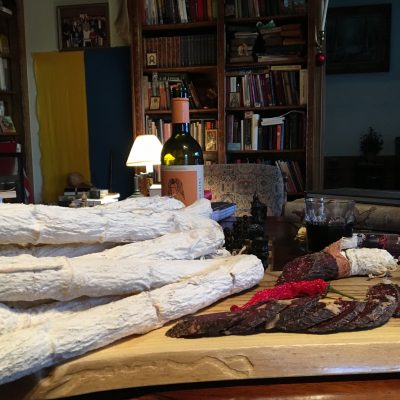
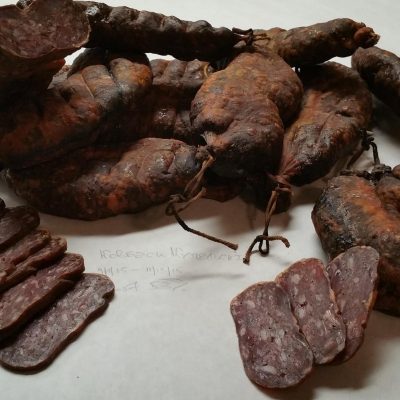
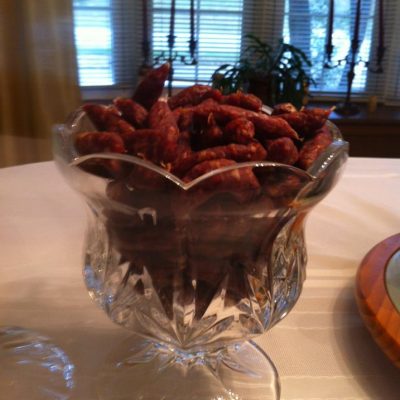
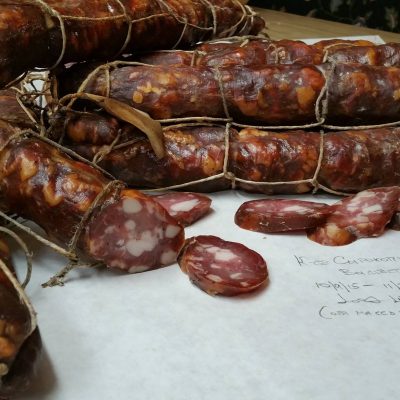
There are no comments yet
Or use one of these social networks